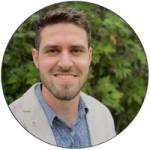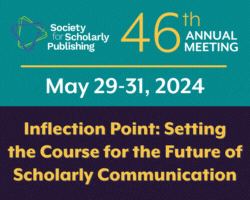New Member Profile
 SSP membership offers a variety of opportunities for professionals across the field of scholarly publishing. In our profiles featuring individuals who have recently joined, learn about the experiences of new members as they spotlight ways to get involved, connect with colleagues, and share knowledge in the industry.
SSP membership offers a variety of opportunities for professionals across the field of scholarly publishing. In our profiles featuring individuals who have recently joined, learn about the experiences of new members as they spotlight ways to get involved, connect with colleagues, and share knowledge in the industry.
Could you describe your career path up to this point?
I started out with my undergrad and grad school in linguistics and a little bit of anthropology. I was originally interested in language documentation, language rights, and language endangerment. And within the last year or two, I’ve been switching to publishing. I’ve done a little work as a volunteer for the last year, as a copyeditor at a journal out of my grad school, which was the University of Hawaii. And now I’m trying to make that full transition into an actual career move into publishing.
Why did you choose publishing?
I really liked the idea of helping spread education as much as possible. And as somebody who’s interested in language rights and language endangerment, I want to be able to help people get knowledge and education, and spread that as best as I can. Also, I really enjoy being around academics, and I’d like to continue doing that in any way. I like coming up with connections between a lot of different topics and helping a problem forward. Just thinking in these larger ways of developing education and improving it for everybody. That’s how I think about it.
What does your work in publishing look like now?
I’ve been doing copyediting. So I’ll get the manuscripts, and I go through them, doing basic copyediting and proofreading, basic formatting of references, tables, figures, and all of that for a journal out of the University of Hawaii, called Language Learning, and Technology, which focuses on exactly that: how people learn language and how technology can help with that. A recent paper I edited described technology for hearing–impaired or sight–impaired folks, and how language learning can still be very possible and very equitable.
How does your background play a role in how you approach publishing?
Having studied language endangerment and minoritized languages, and working with communities who have this as their passion, I think of access and making sure people’s voices are heard. Within publishing—especially for endangered language or minoritized language communities—there’s the talk of data ownership and how language is supposed to be discussed in terms of indigenous rights. It gets into the discussion of what to do if something is said in a paper that is wrong, or whether communities can retract permission for publishing. With dissertations and Master’s theses, a lot of universities will require them to be first authored by the writer and single–authored. And if we’re talking about collaboration with communities, being a sole factor of a lot of Humanities and Social Studies work with indigenous cultures and communities of minorities, collaboration is very important in that sense, because we don’t want to continue colonial or imperialistic ideas within academia. So if it’s first–authored and single–authored in this way, is that really collaboration? There’s a lot of discussion about that. It’s a very heated debate.
Also, there’s discussions of universal ownership, which is problematic, especially for folks in the North American context of the idea that this is the world’s knowledge that needs to be preserved or saved, which is a very white–savior, colonialist idea. It is the same argument that you’ll find within museums that will hold onto indigenous communities’ material culture as well. It’s ownership of what belongs to somebody else.
These are the things that I’m thinking about, that I’m concerned with, and want to help with by being in the discussion. Now that I’ve been switching to publishing as my main focus and my career, I’ve been very happy to see that these discussions are happening. Some of the discussions may not be super far along, but they are definitely at the forefront of people’s minds, which is something that I really value.
How did you find SSP?
I am somebody who really enjoys podcasts and going deep into a field. As I was trying to look for my next position, I started looking for podcasts talking about publishing, and books talking about publishing, and I found the Early Career Development Podcast with SSP. Then from there, I started looking more into it and decided to finally become a member as I was starting to narrow down what my focus was going to be.
It was around the same time I joined that the Communities of Interest Network discussion started. I was glad to see the Early Career Professionals group because it showed me that there were actual people caring about this instead of just saying that this was a great place for early career people, there’s meaningful action happening. That was important to me. As well as with the Humanities and Social Sciences group… I believe it was said even in the discussion, at its inception, that there weren’t really a lot of spaces for people talking about Humanities and Social Sciences within this field. So as I started off, finding this community, it was very nice to have it as a starting point.
How have you found the community in general?
I would say it’s very welcoming. I’ve been trying more and more to do some networking and talk to folks, to ask questions about what they’ve been up to and what they’re thinking about currently. Everybody seems very helpful. Even the folks who don’t necessarily have the time to sit down to talk, they’re more than willing to write a longer email than most people would expect. They’re really not afraid to share what they know. One issue for somebody who is starting off is that there is a lot of ambiguity within career descriptions or job descriptions, about the actual work that’s being done. So there’s the publishing, obviously, but within the larger scheme of scholarly communication, there’s a lot of overlap. Being able to speak to people who have more experience in that is very valuable. It helps to understand the linking ties between these different ideas and concepts.
In terms of other avenues of involvement with SSP membership, have you considered attending any webinars or the Annual Meeting or seminars?
I went to the early career webinar this summer, and I’ve been going to a lot of webinars within scholarly societies that aren’t necessarily publishing, as well as other publishing webinars within copyediting groups and organizations. I’ve been learning more about editing itself, as well as what the scholarly community is talking about and concerned about.
Looking to the future, do you plan on attending any more events or getting more involved in other ways, on committees or a mentorship program, or anything else?
I am a part of the mentorship program, I’ve been accepted into it for this next cycle, and I got my first assignment. And I want to attend more meetings and ideally get to go to some in person. But travel is a little difficult, so getting to what I can is how I’ve been focusing on it. I’ve been attending some type of event at least every two weeks, I would say, if not talking to somebody every week.
If you were giving advice to someone who is considering going into publishing or getting involved with SSP, what would you say?
I think one of the things that I needed to get through my own head was how necessary talking to people is because you can’t learn everything in a book, you can’t read it all online. You need to clarify with people what you understand and what you don’t understand, and you can’t clarify what you don’t understand unless you’re talking to somebody. Also, branching off from what you first think is the right path is okay. Listening to people who aren’t doing that first thing that you think you want to do is okay. If anything, it lets you understand why you want to do that path more. So I would say talking is really the best, and you’ll hear that from everybody, even outside of publishing. It’s more than a text conversation or email conversation, it’s face-to-face or at least camera-to-camera, I suppose. It feels less productive than filling out a bunch of applications, but it does wonders more.
Do you think societies facilitate those kinds of conversations?
Societies can facilitate it, and they certainly say that they can. I think they typically have the infrastructure to facilitate it. But I would say, in my experience, SSP is really the one that laid out an actual path for it.
SSP members represent the many elements involved in the broad field of scholarly publishing — publishers, e-product developers, librarians, publishing service vendors, editors, and more. Learn about the benefits of joining our community!


